北辛中学八年级英语上册Unit6
八年级英语上册 Unit 6《How long have you been collecting s

Unit 6 How long have you been collecting shells?【单元目标】Ⅰ.单词与短语collect marathon skate pair since raise several stamp kite monsterglobe anyone store cake particularly collector common extra topiccapital thousand quite certain missrun out of 用完;用尽by the way 顺便;附带说说be interested in 对……感兴趣more than 比……多make a list of 列清单thanks for doing sth. 感谢某人做了某事thanks for helping me.Thanks for your help.think of / about sth. 想起某事Ⅱ.目标句型:1. How long have you been doing…?2. I've been doing…since…3. How long did sb. do…?4. He / She did sth. for…5. What do you collect?6. When did you start?7. How many do you have?8. What do you like to collect in the future?9. What is the most common/unusual/interesting hobby?Ⅲ.语法现在完成进行时【重难点分析】1. 现在完成进行时构成:肯定句:主语 + have / has been + doing ….否定句:主语+have/has + not + been + doing …一般疑问句:Have/Has + 主语 + been + doing?现在完成进行时表达"某一动作从过去开始一直持续到现在,有可能还要持续下去",现在完成进行时的句子中多用延续性动词,如:live,learn,study,work等。
八年级英语上册Unit6I’mg...
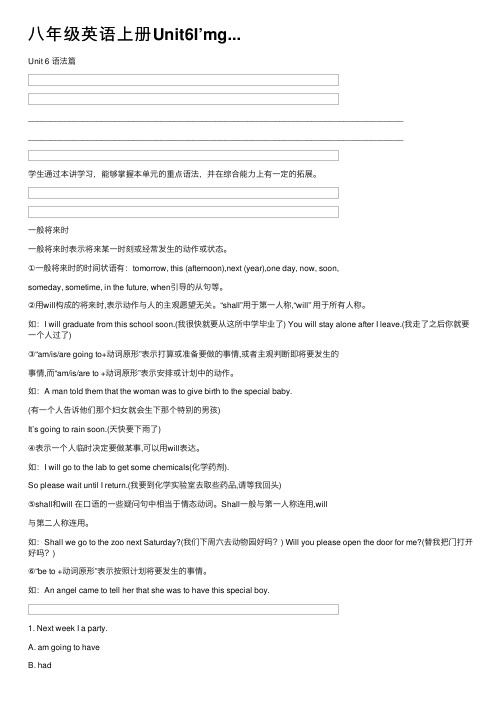
⼋年级英语上册Unit6I’mg...Unit 6 语法篇____________________________________________________________________________________________________________________________________________________________________学⽣通过本讲学习,能够掌握本单元的重点语法,并在综合能⼒上有⼀定的拓展。
⼀般将来时⼀般将来时表⽰将来某⼀时刻或经常发⽣的动作或状态。
①⼀般将来时的时间状语有:tomorrow, this (afternoon),next (year),one day, now, soon,someday, sometime, in the future, when引导的从句等。
②⽤will构成的将来时,表⽰动作与⼈的主观愿望⽆关。
“shall”⽤于第⼀⼈称,“will” ⽤于所有⼈称。
如:I will graduate from this school soon.(我很快就要从这所中学毕业了) You will stay alone after I leave.(我⾛了之后你就要⼀个⼈过了)③“am/is/are going to+动词原形”表⽰打算或准备要做的事情,或者主观判断即将要发⽣的事情,⽽“am/is/are to +动词原形”表⽰安排或计划中的动作。
如:A man told them that the woman was to give birth to the special baby.(有⼀个⼈告诉他们那个妇⼥就会⽣下那个特别的男孩)It’s going to rain soon.(天快要下⾬了)④表⽰⼀个⼈临时决定要做某事,可以⽤will表达。
如:I will go to the lab to get some chemicals(化学药剂).So please wait until I return.(我要到化学实验室去取些药品,请等我回头)⑤shall和will 在⼝语的⼀些疑问句中相当于情态动词。
Unit 6 CW 第1课时教学课件
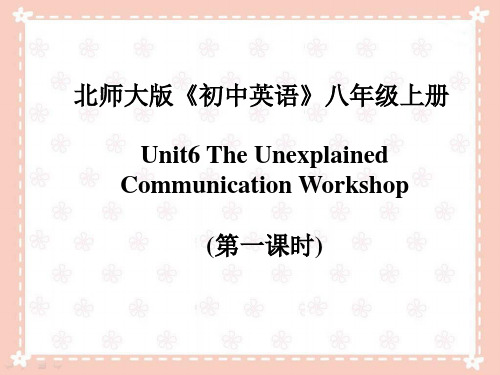
Look at the second passage and find out some of the linking words . Then, use them to connect the sentences.
then, after that, first, finally,
Last night, she had a strange dream. She was in primary school. __F_ir_s_t __She was talking to her friend Janet. _T_h_en__ Suddenly someone was running behind them. A__ft_e_r _that They went to the top of the school building. __F_in_a_ll_y__She woke up and she was on the floor.
Summary the aspects oion about your dream.
1. Include details about the dream. 2. Use Vocabulary correctly, grammar. 3. Use the past simple and the past continuous form. 4. Use conjunctions to express clearly.
5. ---
Writing
Think of a strange dream of yours. What happened in the dream? Tell us about your dream. (Pay attention to the aspects )
八年级英语上册 Unit 6《Celebrations》教案和练习1 北师大版

It’s 7:00 p.m. It’s time for CCTV news.
It’s time for dinner.
6. arrive at/in
Mr. Smith will arrive in China next Sunday.
1.复习时态:一般现在时,现在进行时。
2.表示日期,节日的短语。
三.具体内容:
(一)句型:
I. Two famous Festivals in the texts:
1. In the United States
2.This is the most important festival of the year. It is a time when all the family gets together –just like Thanksgiving and Christmas in the United States.…right now, Mrs. Zhang is cleaning the house. People clean their houses from top to bottom. Mr. Zhang is painting the window frames of the house with red paint. This is another tradition. I think red is supposed to be lucky color. Lucy, the Zhangs’ daughter, is writing out The Spring Festival Couplets to hang on the door. She’s painting with black paint on pieces of red paper. The couplets are very short—only two lines. Chinese people hang these couplets on their front doors—one line on each side of the door.…
八年级英语上册 Unit 6重点内容详解及练习
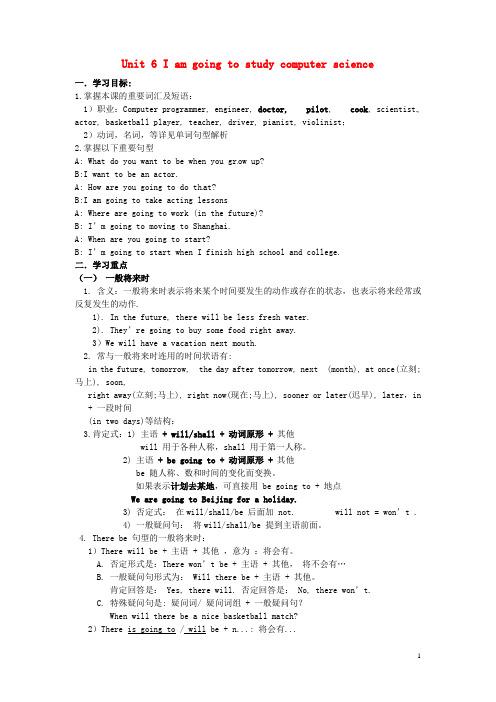
Unit 6 I am going to study computer science一.学习目标:1.掌握本课的重要词汇及短语:1)职业:Computer programmer, engineer, doctor, pilot, cook, scientist, actor, basketball player, teacher, driver, pianist, violinist;2)动词,名词,等详见单词句型解析2.掌握以下重要句型A: What do you want to be when you gr ow up?B:I want to be an actor.A: How are you going to do th at?B:I am going to take acting lessonsA: Where are going to work (in the future)?B: I’m going to moving to Shanghai.A: When are you going to start?B: I’m going to start when I finish high school and college.二.学习重点(一)一般将来时1. 含义:一般将来时表示将来某个时间要发生的动作或存在的状态,也表示将来经常或反复发生的动作.1). In the future, there will be less fresh water.2). They’re going to buy some food right away.3)We will have a vacation next mouth.2. 常与一般将来时连用的时间状语有:in the future, tomorrow, the day after tomorrow, next (month), at once(立刻;马上), soon,right away(立刻;马上), right now(现在;马上), sooner or later(迟早), later,in + 一段时间(in two days)等结构:3.肯定式:1) 主语+ will/shall + 动词原形 + 其他will 用于各种人称,shall 用于第一人称。
初二英语上学期unit 6.doc

Go for it 八年级(上)Unit 6 I’m more outgoing than my sister单元教案I 教学内容、目标与要求II 教学内容分析本单元以描述某人的个性特征为中心而展开, 从外表和性格两方面比较人物之间的相同与不同点, 由此引出taller, shorter, thinner, longer, heavier, calmer, wilder, quieter, funnier, more athletic, more popular, more serious, more outgoing 等词汇, 以及“S + be + adj.比较级+than+被比较对象”这个重要的句子结构。
Section A部分重在要求听说读三个方面比较不同双胞胎之间外表和性格的区别, 附带着在3a也提出了as….as 结构the same as结构表达两人的相同之处。
与Section A部分比较, Section B部分则深入到比较自己和朋友的相同与不同之处, 并提出了“选择朋友”这个话题, 引导学生正确评价朋友, 引导学生结识真正的好朋友。
III 教学过程建议围绕本单元“描述个性特征”这一话题,教师可以在课堂上展开系列的两人一组活动引出本单元的主要单词和句子结构“S + be + adj.比较级+than+被比较对象”。
如任务一:你眼里的我?学生两人一组展开活动,分别在各自的卡片上写下一些形容词,描述对方的身体和性格特点。
任务二:咱们相同吗?学生两人一组展开活动,通过比较各自的卡片,找出自己和对方相同的地方,简单地表述这些相同之处,然后进一步比较这些相同之处,说说它们在程度上的区别。
也可以准备一些教师自己或学生不同时期的照片,先用所学过的形容词描述照片,然后把两类照片进行比较,从而引出本单元所要讲的形容词的比较级。
本单元的听力练习教师可以根据学生的实际情况适当的扩展增加或降低难度。
在“说”方面,教师应尽量选择学生感兴趣的话题,激发学生开口交流。
初二英语上册Unit6教案4.doc
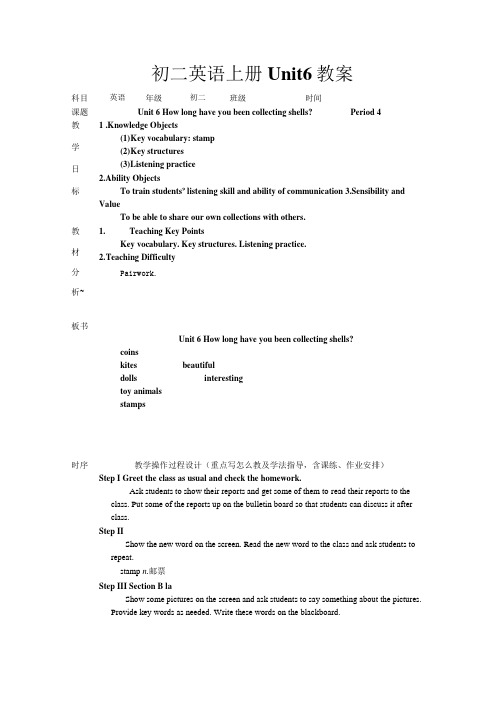
初二英语上册Unit6教案科目英语年级初二班级时间课题Unit 6 How long have you been collecting shells? Period 4教学日标1 .Knowledge Objects(1)K ey vocabulary: stamp(2)K ey structures(3)L istening practice2.Ability ObjectsTo train students9 listening skill and ability of communication 3.Sensibility and ValueTo be able to share our own collections with others.教材分析〜1.Teaching Key PointsKey vocabulary. Key structures. Listening practice.2.T eaching DifficultyPairwork.板书Unit 6 How long have you been collecting shells?coinskites beautifuldolls interestingtoy animalsstamps时序教学操作过程设计(重点写怎么教及学法指导,含课练、作业安排)Step I Greet the class as usual and check the homework.Ask students to show their reports and get some of them to read their reports to the class. Put some of the reports up on the bulletin board so that students can discuss it afterclass.Step IIShow the new word on the screen. Read the new word to the class and ask students to repeat.stamp n.邮票Step III Section B laShow some pictures on the screen and ask students to say something about the pictures.Provide key words as needed. Write these words on the blackboard.Play the recording. If necessary, pause it after each conversation to give students time to finish writing their answers.Correct the answers.AnswersBob: since he was ten years old,22Marcia: for five years,35Liam: since last year,20Step VII 2c PairworkThis activity provides guided speaking and listening practice using the target language.Let students ask and answer questions about Bob, Marcia, and Liam.First point to the example in sample dialogue.A: What does Bob collect?B: He collects kites.A: How long has he been collecting kites?B: He's been collecting kites since he was ten years old.Then ask students to practice conversations in pairs. When students work, move around the room checking their progress and offering help as needed.At the end ask several pairs of students to say their conversations to the class.Step VUI Optional ActivityPlay a memory game with the class. Ask questions such as Who collects stuffed animals? What does Liam collect? How long has Marcia collected stuffed animals? How many tickets does Liam have? Ask students to answer in complete sentences.Step IX SummaryThis class we've learned some key vocabulary and done some listening, speaking and writing practice.Step X HomeworkPreview the new words on next page.教学后记。
八年级英语上册第6单元知识点(K12教育文档)

八年级英语上册第6单元知识点(word版可编辑修改)八年级英语上册第6单元知识点(word版可编辑修改)编辑整理:尊敬的读者朋友们:这里是精品文档编辑中心,本文档内容是由我和我的同事精心编辑整理后发布的,发布之前我们对文中内容进行仔细校对,但是难免会有疏漏的地方,但是任然希望(八年级英语上册第6单元知识点(word版可编辑修改))的内容能够给您的工作和学习带来便利。
同时也真诚的希望收到您的建议和反馈,这将是我们进步的源泉,前进的动力。
本文可编辑可修改,如果觉得对您有帮助请收藏以便随时查阅,最后祝您生活愉快业绩进步,以下为八年级英语上册第6单元知识点(word版可编辑修改)的全部内容。
Unit6 I’m going to study computer science.一、词的转换1。
violin小提琴 (表人)violinist 小提琴家2。
piano钢琴(表人)pianist 钢琴家3。
science科学(表人)scientist科学家4.drive开车(表人)driver 司机5。
education教育(形容词)educational 有教育意义的6.send发送过去式sent7.foreign外国 (表人)foreigner外国人8.mean意味着(名词)meaning意思9.discuss讨论(名词)discussion讨论10。
begin开始 (名词)beginning开始11。
hobby爱好(复数)hobbies12。
week一周(形容词)weekly每周的13。
one person一个人(不可以说one people) (形容词)personal 个人的14.different 不同的(名词)differences不同、差异二、短语归纳1.grow up成长;长大2. improve in 在。
.。
.有所提高3。
be sure about对……有把握4。
make sure确信;务必+to do sth5.send…to…把……送到……6.be able to do sth 能够做某事 =can+动词原形7.the meaning of……的意思8。
八年级英语上册 Unit 6 How long have you been collecting s

I. Teaching aims and teaching demands:In this unit students learn to talk about how long you have been doing things.II. Teaching key and difficult points:Vocabularycollect, inline, marathon, skate, stamp, shell, globe, monster,particularly, run out of, be interested inlast year, times, numbers, How long…? student, school, birthday, penguin, hobby, kite B. Target languageHow long have you been skating?I’ve been skating since nine o’clock.When did you start skating?I started skating at nine o’clock.Students are skating at the Hilltop School.StructuresPresent perfect progressiveSimple past tensePresent progressive tenseIII. Teaching methods: Audio-lingual methodsIV. Teaching aids: a tape recorderV. This unit is divided into eight periods.Period 1 Speak and listenSection A 1a---1cI. Teaching aims and demands:Students learn to talk about how long they have been doing things.II. Teaching key and difficult points:Vocabularycollect, shell, marathon, skate, a pair of, since, Hilltop schoolTarget languageHow long did you sleep last night?When did you start class today?How long have you been in class today?III. Teaching methods: Audio-lingual methodsIV. Teaching aids: a tape recorderV. Teaching procedureActivity 1. Warming up1. A:When did you start studying English?B:1997.A:He started studying English in 1997.He has been studying English since 1997.Repeat: He has been studying English since 1997.(for five years)2.A:When did you start to swim?B:I started to swim in 2003A: She started to swim in 2003.She has been swimming since 2003.( for three years)Repeat: She has been swimming since 2003.( for three years)When did you start to ride a bike?When did you start to play basketball?Point to the starting date and the prese nt year.Activity 2. PresentationThis activity provides oral practice using the target language.Task 1. Ask the students to discuss these questions:1.How long did you sleep last night?2.When did you start class today?3.How long have you been in class today?Task 2.Talk about the Structures1.have/ has + p.p ( a lready, just, yet, ever, never, before,)He has just won the game.They have already finished their homework.I have lived here for 20 years.2.I saw the film last week.We visited the museum yesterday.3.have/has been + doingThat boy has been collecting stamps for ten years.The nurse has been working like that.I have been skating for five hours.Help the Ss understand that did question means that the person has stopped doing the action.The have you been question shows that the person is continuing to do the action at the present moment. Activity2. Listen and fill in the c hart 1b.Task 1. Play the recording the first time. Students only listen.Task 2. Play the recording a second time. Students number the pictures. Then check the answers. Activity 3. PairworkAsk the students to ask and answer about what the people in the picture.HomeworkMake up your own conversations.2. Write down the sentences in 1c.Period 2 Listen and speakSection A 2a---Grammar FocusI. Teaching aims and demands :Students learn to talk about how long they have been doing thingsII. Teaching key and difficult points:Vocabularycollect, shell, marathon, skate, a pair of, since, Hilltop schoolTarget languageHow long did you sleep last night?When did you start class today?How long have you been in class today?III. Teaching methods: Audio-lingual methods and PPPIV. Teaching aids: a tape recorderV.Teaching procedureActivity 1. RevisionTask1. Check the homework. Ask and answer.How long have you been sleeping?How long did you sleep last night?How long have you been skating?Activity 2. Listening and checking .Task1.Read the instructions. Read the questions and the answers.Task2. Play the recording twice and students the questions they hear. Then check the answers. Activity 3.ListeningTask 1. Read the instructions.Task 2. Play the recording again and check the answers.Activity 4. pairworkTask 1.Read the instructions for the activity.Task 2.Role play the interview.Task 3. Have the students work in pairs.Activity 5. Grammar FocusReview the grammar box. Make sure the students can tell the difference between the following:1.I have been skating since nine o’clock.I skated for two hours.2.for, sinceHomeworkReview the conversation and the vocabulary.Write the sentences in grammar focus.Period 3 Reading and writingI. Teaching aims and demands :Students learn to talk about how long they have been doing things.II. Teaching key and difficult points:A. Vocabularyraise, several, skater, three and a half years, three years and a halfevery,eachB. Target languageHow long have you been playing?The skating marathon has been going for five hours.He has been skating for the whole five hours.When did you start playing tennis?III. Teaching methods: Audio-lingual methods and Control-reading and writing.IV. Teaching aids: a pictureV.Teaching procedureActivity 1. RevisionTask 1.Revise the vocabulary and the key structures.Task 2.Dictation.Activity 2. Reading and writingTask 1 .Read the instructions.Task 2. Ask several students to read the passage to the class, Then ask the students to fill the table on their own.Then check the answers.Activity 3. WritingThis activity provides guided oral practice using the target language.Task 1. Read the instructions. And then ask several students to say out their answers.Task2.Finish the table. Ask one or two students to read their answers to the class.Activity 4. GroupworkThis activity provides an opportunity for students to practice their speakingand listening skills in role plays.Task 1. Read the instructions. Then ask the students to work in groups of four students.Task 2. Ask students to interview their classmates and fill in the chart.Task 3. Ask a few students to role plays to the class.Homework1.Review the vocabulary and target language.2.Make your own conversation .Period 4 Section BI. Teaching aims and demands :Students practice using the target language.II. Teaching key and difficult points:A. Vocabularystamp, collect stamps, kites,B. Target languageWhat does he collect? He collects kites.How long have you been collecting these kites?Since I was ten years old.How many do you have?I have about 35.I collect shells because they are beautiful.I’d like to collect stamps because they are interesting.Activity 1. Revision This activity reviews and introduces selected vocabulary.Task 1. Ask a student to read the sample answers and then fill in the chart and tell your partner what you collect and what you would like to collect, say why.Task 2.PairworkFirst read the conversation in the box, then ask students to work in pairs to talk about their answers .Task 3. Have some pairs act their conversations to the class.Activity 2. ListeningThis activity gives students practice writing the target language and understand it in spoken conversation.Task 1. Read the instructions.Point to the pictures and ask students to tell what they see. Say you will hear three conversations They are about Bob, Marcia , and Liam and their collections.Task 2. Play the recording the first time. Students only listen.Task 3. Play the recording a second time.Ask the students to fill in the table Then correct the answers.Activity 3.ListeningTask 1. Ask different students to read the information on the four report cards.Task 2.Listen carefully.Then check the answers .Activity 4. PairworkTask 1.Read the instructions.Task 2.Ask two students to read the conversation to the class.Ask some pairs of students to say their conversation to the class.Homework1.Review the vocabulary .2.Write your own conversations about your collections.Period 5 Reading and writingI.Teachi ng aims and demands :Students practice the target language by reading and writing.II. Teaching key and difficult points:A. Vocabularygrandpa, be in good health, report card, nervous, envelope, luckily.\, semester, true, disappointing, lucky.B. Target languageMy math teacher said that I was hard-working.My Spanish teacher said that my listening was good.You are lucky.III. Teaching methods: Audio-lingual methods and Control-writing.IV. Teaching aids: a tape recorderV. Teaching procedureTask1. Check the homework. Ask and answerWhat did your math teacher say?He said I was hard-working.Task2.Revise the vocabulary.Activity 2. Reading and writingTask 1.Teach these words:Task 2. Ask the students to read the instructions.Task 3. Ask the students to read the letter and find Alan’s report card in activity 2b on page 29. Task 4.Read the letter l oudly, and make sure the students understand the letters.Correct the answers.Activity 3. WritingTask 1. Read the instructions.Ask students to read the information of Scott from activity 2b Task 2. Ask the students to write the letters on their own.Task 3. Ask some students to read their letters to the class.Activity 4. Writing on your own.read the instructions.ask the students to say something they might write about.ask some students to read their letters.Activity 5. PairworkAsk the students to read the instructions.Ask two students to read the dialogue.Ask students to complete the work in groups.Ask a few students to share the sample conversations.Homework1.Review the vocabulary .2.Finish off the writing exercises.Period 6 Reading and writingI.Teaching aims and demands :Students practice the target language by reading and writing.II. Teaching key and difficult points:A. Vocabularyhappen, bring, copy, borrow, pass on, own, get over, have a fight,B. Target languageMy math teacher said that I was hard-working.My Spanish teacher said that my listening was good.She asked me if she could copy my homework.I said that was OK and that I was sure she would get over it.III. Teaching methods: Audio-lingual methods and Control-writing.IV. Teaching aids: a tape recorderV. Teaching procedureTask1. Check the homework. Ask and answerWhat did your math teacher say?He said I was hard-working.Task2. Revise the vocabulary.Activity 2.Fill in the blank.Task 1.Teach these words.Task 2. Ask the students to fill in the blanks on their own.Task 3. Correct the answers.Activity 3. Read and Writing1.Ask the students to read the story and then write it as a conversation.2.Ask a few students to read their conversations.3.Just for fun. Ask two students to read the conversation to the class.Homework1.Review the vocabulary .2.Finish off the writing exercises.Period 7 Reading and writingI. Teaching aims and demands :Students learn to master the readi ng skills.II.Teaching key and difficult points:A. Vocabularyvillage, area, meter, thin, decision, husband, college, open up. start, influence, hometown, danger B. Target languageShe said helping others changed her life.She said that she likes being a good influence in the children’s lives.III. Teaching methods: Audio-lingual methods and Control-reading and writing.IV. Teaching aids: a tape-playerV.Teaching procedureActivity 1. RevisionTask 1.Revise the vocabulary and the key structures.Task 2.Dictation.Activity 2. Before You ReadTask 1 .Read the instructions.Encourage the students to be aware of needs in their community, and how they can be of help. Show students a picture of elder people . Ask the class about their grandparents or great grandparents. Ask students how they think they can help make the lives of old people easier and more pleasant.Ask the students totalk in groups and list other people in the community who need help.Ask a few students to tell their ideas to the rest of the class..Task 2.Teach the students about reading strategy-------Reading for meaning. Reading a passage for” meaning” first----it is important to understand the whole story before you learn the details. Words you don’t know can often be understand by reading the language around them.Activity 3. While You ReadingThis activity teaches the students to read for meaning and not for detail.Direct the students’ attention to the Reading Strategy.Ask a volunteer to read it out loud. Make sure the class understands the advice.Explain to the students that this reading has missing words, but the students must not fill in the words as they read the first time.Ask the Ss to read silently through to the end without stopping.Ask the Ss to say if they have generally understood the story.Direct the students’ attentionHomework1.Review the vocabulary and target language.2.Write your own conversations about problems and advice.Period 8 Reading and writingI. Teaching aims and demands :Students learn to master the reading skills.II.Teaching key and difficult points:A. Vocabularyvillage, area, meter, thin, decision, husband, college, open up. start, influence, hometown, danger B. Target languageShe said helping others changed her life.She said that she likes being a good influence in the children’s lives.III. Teaching methods: Audio-lingual methods and Control-reading and writing.IV. Teaching aids: a tape-playerV. Teaching procedureActivity 1. RevisionTask 1. Dictation.Task 2. Read the passage to the class.Activity 2. After You ReadTask 1. Ask Ss to read through again to find the relevant information for Yang Lei’s students. Task 2. Complete the information .Task 3.Discuss their answers.Activity 3. Ask and answerAsk the students to ask and answer the questions.Activity 4. WritingWrite a summary of the reading. Use no more than 100 words.Task 2.Review language used for advice.Then imagine you are Dr Alice Green.Write a letter to Cathy Taylor. Give advice about what she should do with her children.Activity 5. Go for it !Ask the students to discuss the groups in the chart and explain the names of the gro ups and tell us what they stand for.Which one would you like to work for? Why?Homework1.Review the vocabulary .2.Finish writing the Summary writing.。
北师大版八年级英语上册课件:Unit 6 The Unexplained Communication Workshop(两课时)

Writing
Think of a strange dream of yours. What happened in the dream? Tell us about your dream. (Pay attention to the aspects )
Tell the class about your dreams.
一般过去时 过去进行时
First, then, after that,
finally
Teacher says
A dream
细节表 达的逻 辑性, 语句连
贯
Add more
正确使用 语法,词汇
句式多样, 词汇丰富---
Group evaluation
Exchange your composition in group. Read their compositions each other. Check and correct the composition then give suggestions to your partners.
1.What was she doing in the primary school? She was talking to her friend Janet. 2.Why were they getting scared?
Because suddenly someone was running behind them.
Answer:
When Tara the elephant couldn’t see Bella, she became very sad. When someone carried Bella out, Tara was so happy.
八年级英语上册 Unit 6 I love learning English单元教案 冀教版
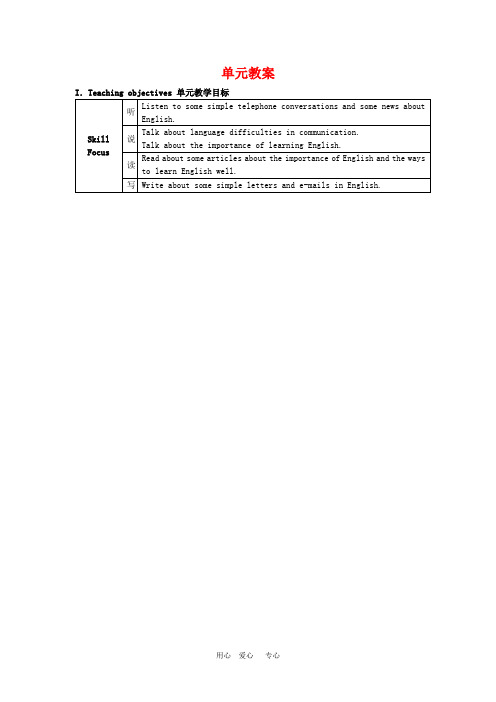
单元教案II. Teaching materials analyzing and rearranging教材分析和教材重组1.教材分析本单元以I love learning English 为话题,旨在通过单元学习,使学生了解学习英语的重要性, 以及如何学好英语;帮助学生认识学好英语将为他们提供更多好的就业机会。
从而激发他们学习英语的积极性和热情,坚定学好英语的信心, 并通过阅读、讨论故事和报道性文章,试着找到适合自己的学习方法和策略。
1.1Lesson 41 A Phone Friend 通过学习李明、王梅和Jenny打电话的一段内容,使学生掌握并能够熟练地用英语打电话。
1.2Lesson 42 Welcome to the World of English! 从学习英语的人数、重要性(英语是至少45个国家的官方语言, 是联合国的工作语言之一)等方面的介绍,使同学们认识到学习英语的必要性。
1.3Lesson 43 Write a Letter in English! 通过阅读王梅给笔友Jessica写的一封英文信,学习英文信的写作。
1.4Lesson 44 Say the Word 通过这首歌,帮助同学们学习如何读一些比较难读的英语单词。
同时,让同学们讨论如何更好地学习英语。
1.5 Lesson 45 Keep Trying! 通过介绍Jessica学习英语的方法,使同学们养成勤查字典,多读,多说的习惯,并且要坚持不懈、持之以恒。
1.6Lesson 46 Your Future and English 通过介绍几个与英语有关的职业,让同学们进一步体会学习英语的重要性。
1.7Lesson 47 Some News About English让学生通过阅读报纸上一则题为Open the Door to the World的新闻,使同学们认识到英语是打开通往世界之门的钥匙, 从而坚定他们学习英语的信心。
- 1、下载文档前请自行甄别文档内容的完整性,平台不提供额外的编辑、内容补充、找答案等附加服务。
- 2、"仅部分预览"的文档,不可在线预览部分如存在完整性等问题,可反馈申请退款(可完整预览的文档不适用该条件!)。
- 3、如文档侵犯您的权益,请联系客服反馈,我们会尽快为您处理(人工客服工作时间:9:00-18:30)。
北辛中学八年级英语(上)Unit6过关测试题2012.10.31一、根据句意及首字母提示完成单词。
( 10分)。
1. B _____ Lily and Lucy are outgoing. They have lots of friends.2. Edison showed great i_______________ in science when he was alittle boy.3. Nina went to school t ________________she didn’t feel very welltoday.4. I’m d_________________ from Rick. He is a little calmer than I.5. It’s not polite (礼貌的) to l__________________ at others when theymake mistakes (错误).二、用括号中所给词的适当形式填空。
(10分)6. Tom is much ___ than Sam. ( cool )7. My hair is a little ____ than hers. ( short )8. Pedro is _______ than Paul. ( funny )9. Li Ping is a little than me. ( outgoing )10. Which is ____________________ in China, tea or coffee? ( popular)11. Tina is much than Tara. ( athletic )12. Liu Li is a little than her sister. ( quiet )13. Ruth is _____ than any other girl in my class.( serious )14. Java has hair than Mary. ( curly )15. Paul is than Pedro. ( thin )三、单项选择( 20分)16. Liven is than I am.A. funny and outgoingB. more funnier and outgoingC. funnier and more outgoingD. more funny and outgoing17. Tina is better at physics than Tara.A. moreB. muchC. veryD. a lot of18. Li Ping and Li Ming black eyes.A. has bothB. have bothC. both haveD. both has19. My brother is more outgoing than me.A. moreB. mostC. a littleD. little20. I a primary school student two years ago.A. wasB. amC. beD. were21. Here are photos of twin sister and .A. me, IB. my, meC. me, myD. I, me22. My friend is as me. We are both quiet.A. as sameB. so sameC. the sameD. no the same as23. She likes singing, dancing and talking with others.But I often stay at home and read books. So I am______than her.A.funnierB. quieterC. more outgoingD. wilder24. My father never eats junk food, and he exercisesevery day. So he is ______ .A. unhealthyB. healthyC. seriousD. smart25. Liu Ying is not __ good at sports __ her sister.A. much, thanB. a littleC. as, soD. so, as26.All of the boys ________ playing football.A.likes B.like C.is like D.are like 27.Helen ________ than Kate.A.is calmer B.is calm C.calm D.calmer 28.Liu Ying and her sister ________.A.look like B.are look the sameC.are look like D.look the same 29.Isabella and Maria ________ girls.A.are all B.are both C.all are D.both are 30.Tara is ________ Tina.A.same as B.the same as C.the same D.as 31.The boy’s hair is ________ the girl’s hair.A.shorter than B.short thanC.shorter D.than32.Thanks a lot ________ me.A.for help B.helpingC.for helping D.to helping33.I don’t like the color of this pen. Could you give me ________ one?A.another B.other C.the other D.others 34.________ he is a little boy, he plays soccer very well.A.Because B.And C.But D.Though 35.My grandma is good ________ Japanese.A.speaking B.at speak C.at speaking D.speak四、英汉互译根据汉语提示完成各句。
(20分)36. 蒂姆留的头发比萨姆短。
Tim has hair Sam.37. 萨姆比汤姆安静得多。
Sam is much _____ than Tom.38. 我们俩都喜欢运动,尽管他看上去比我更强健。
We __ like sports , he looks than me.39. 蒂娜更外向一些,泰拉更严肃一些。
Tina is , but Tarais .40. 莉莉是我最好的朋友,和我相比她更镇静一些。
Lily is my best . She is than me.41. 他们俩都喜欢参加聚会。
They both enjoy .42. 戴夫擅长打篮球。
Dave is playing basketball.43. 我妈妈没有爸爸高。
My mother is not my father. 44. 霍莉比玛利亚滑稽,她喜欢讲笑话。
Holly is very than Maria. Shejokes.45.汤姆在班里很受欢迎,彼得也一样。
Tom is very in his class, Peter. 五.完形填空(20分)Mary has 46 cousins. They are Betty, Peter, Bill and Ann. Mary is the 47 of the five. Betty is thirteen years old. She is two years 48 than Mary and one year older than Peter. Bill is nine and Ann, the 49 , is seven.Betty and Peter are 50 runners. But Peter runs 51 . Mary and Ann like 52 basketball. Mary plays better than Ann. Bill is the 53 of the five. Mary and Betty 54 in a middle school. Peter, Bill and Ann study in a primary school. The five children all work 55 at their lessons. But Betty works hardest.()46.A.three B.four C.five D.six()47.A.older B.younger C.oldest D.youngest ()48.A.younger B.older C.young D.old()49.A.young B.old C.oldest D.youngest ()50.A.good B.better C.well D.best()51.A.fast B.faster C.slower D.moreslowly()52.A.play B.plays C.to playing D.to play ()53.A.good B.better C.the best D.best()54.A.teach B.study C.work D.play()55.A.well B.hardest C.harder D.hard 六.短文填空( 20分)Some friends have 56 views and interests, and some like the 57 things. What is your 58 ? We 59some people what they think and this is what they 60 .I like to have friends who 61 like me. I’m 62 than most of the kids in my class, and my best friend Y uan Li is quiet too. There are some 63 , though. I’m 64 than Y uan Li. She is 65 .。
